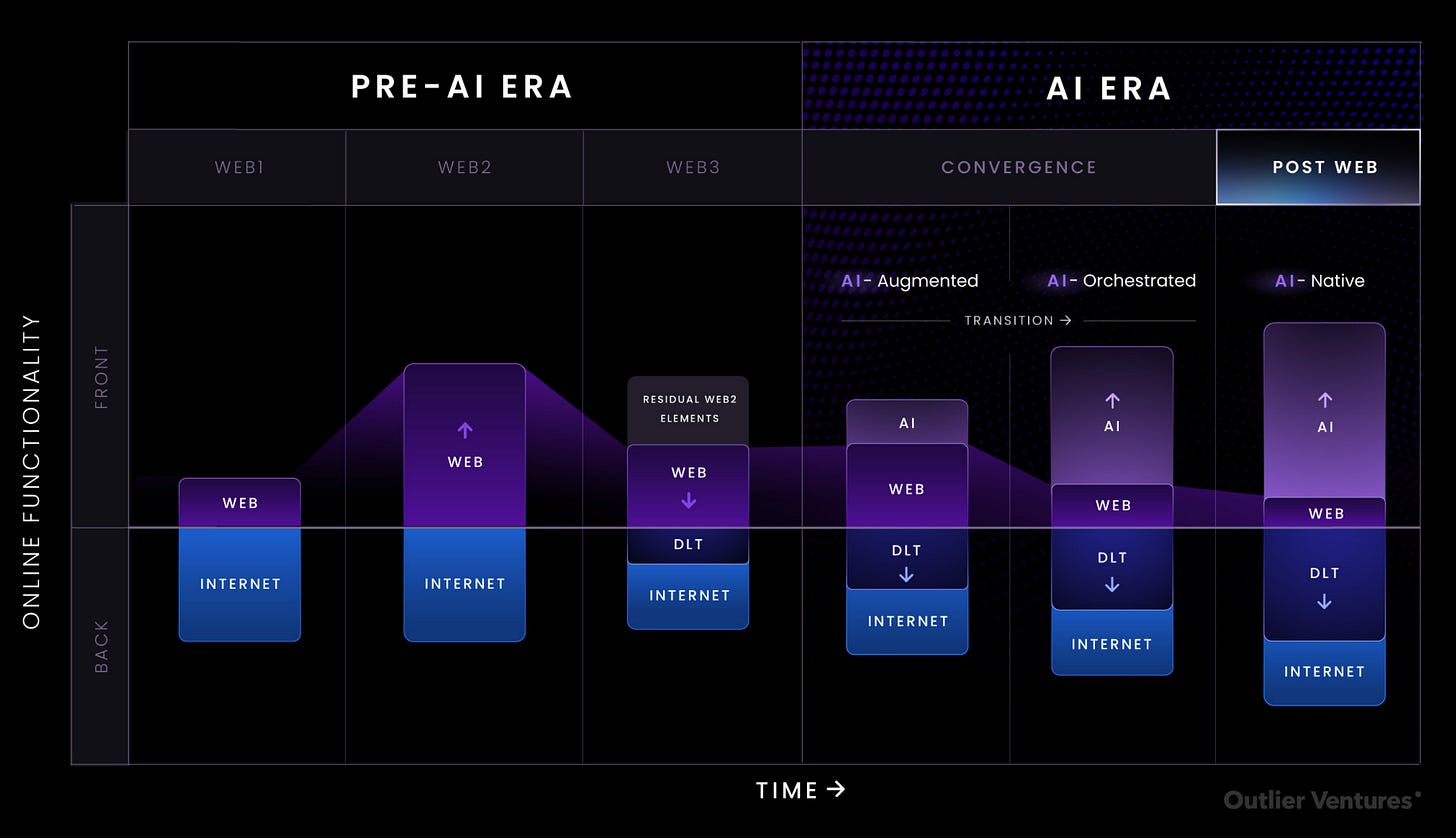Beyond the Browser: Imagining Life in a Post‑Web World
#57: In the post‑web era, technology serves intention, not attention
“The most profound technologies are those that disappear. They weave themselves into the fabric of everyday life until they are indistinguishable from it.” — Mark Weiser, The Computer for the 21st Century
In the post‑web era, the boundaries of economic value shift as AI seamlessly embeds into daily life, guiding us away from visible, screen‑based interactions and toward intention‑driven assistance. It’s more than a technical leap; it’s a culmination of AI‑driven digital transformation that reimagines our relationship with technology. This transition invites us to reconsider our digital transformation roadmap: what users prioritise, how digital interactions unfold and what constitutes value in a purpose‑driven digital landscape. Below, we explore this potential world, examining the ethos, economic structure and evolving digital relationships that define it.
Ethos and foundation of the post‑web economy
The ethos of the post‑web world hinges on a reorientation from sheer volume of content to depth and relevance, from passive consumption to intentional engagement. This aligns with the first hypothesis: Users prioritise quality and relevance over volume and novelty. Rather than being inundated with information, users seek technology that serves precise needs without drawing excessive attention. Here, quality means AI systems should respond with relevance, subtly providing guidance or information only when it aligns with a user’s immediate intention, minimising cognitive load and maximising time efficiency. Crafting a data‑driven digital transformation that respects attention becomes a core competency.
Post‑web thesis by Outlier Ventures
Privacy becomes a core element in this landscape, reflecting the hypothesis that data ownership and privacy will become core components of digital interaction. Personal data transforms from a mere asset into a fundamental right, underpinning user control over digital exchanges. This shift implies a decentralised economy, where data ownership reinforces trust and gives users the agency to determine who can access their information. Privacy‑centred platforms, supported by edge computing, allow for real‑time, localised data processing that upholds user agency. Executing this vision requires digital leadership competencies—leaders who can balance innovation with governance and ethical design.
Hypotheses and economic foundations
In a post‑web economy, value creation follows new principles rooted in personalisation, privacy and community‑driven engagement:
Revenue models will transition from ad‑based to value‑based monetisation. Moving beyond attention‑driven revenue, platforms focus on delivering intrinsic value. As companies design their integrated digital marketing plans, they shift from buying impressions to creating services that enhance life efficiency, wellness or productivity. Instead of competing for screen time, organisations succeed by providing AI that adapts to user needs, with users paying for services that genuinely enhance their experiences.
Social interactions will shift toward purpose‑driven communities. The post‑web social landscape favours communities based on shared values rather than generic networking. Intention‑based AI could match individuals with others who share specific goals or interests—whether in education, wellness or civic projects. This shift toward purpose‑driven communities minimises superficial engagement and fosters trust among members. It also demands a digital workplace transformation, as collaboration tools evolve from broadcasting to facilitating focused, goal‑oriented interactions.
Intention‑driven algorithms will prioritise utility over engagement. Algorithms transition from maximising time spent to optimising task relevance and effectiveness. Intention‑driven algorithms minimise disruptions, focusing instead on actionable insights, personalised suggestions and task support. This functional orientation supports the ethos of the post‑web era, aligning AI with user needs without creating digital noise.
User–platform relationships will become transactional, with clearer boundaries. In contrast to today’s immersive platforms, which blur online and offline boundaries, post‑web platforms will favour transactional relationships. These boundaries preserve user agency, allowing individuals to engage as they wish and withdraw without extended commitments. Users may choose services on an as‑needed basis, reducing dependency on any single digital platform.
Everyday scenarios in a post‑web economy
With these foundations, daily life becomes a blend of context‑aware AI support and decentralised, purpose‑driven engagement. A few scenarios illustrate this vision:
Personalised wellness and value‑based health markets. In health, users pay for proactive, AI‑driven wellness plans that adapt to individual needs. Rather than selling devices or treatments, companies offer continuous, data‑informed monitoring for optimised health outcomes. Here, value lies not in individual purchases but in holistic, intention‑aligned support that adjusts autonomously to life changes. This is an example of AI‑driven digital transformation where the focus is outcomes, not visits.
Community‑focused, purpose‑driven marketplaces. Marketplaces become purpose‑driven, aligning with user goals rather than competing for engagement. Intention‑based algorithms identify goods or services that fulfil specific objectives, such as sustainable living or educational enrichment. By prioritising relevance, these platforms reduce the time spent on transactional browsing and focus on intentional consumption. An integrated digital marketing plan in this context isn’t about ads but about matching offers to intentions.
Trust‑based digital services and decentralised transactions. With an economy grounded in privacy and clear transactional relationships, decentralised technologies support direct interactions. Blockchain or digital token systems could verify data exchanges, ensuring transparency while preserving user control. Digital tokens may be used in communities where the value of goods or services aligns directly with privacy, ethics and efficiency.
Challenges and counterpoints
While the post‑web economy promises a streamlined, intention‑based experience, it faces critical challenges. A system where data ownership and privacy are core requires rigorous safeguards. Without robust privacy measures, companies risk infringing on autonomy by predicting choices without full user awareness. Studies reveal deep‑seated mistrust among users, with approximately 70 % expressing scepticism over companies’ responsible use of AI. Such apprehensions underscore the need for strong, transparent data practices.
Moreover, the transition to a value‑based monetisation model requires companies to demonstrate direct benefits to users—a stark departure from ad‑based revenue models that monetise attention. Intention‑driven algorithms could also limit exposure to new perspectives, as AI isn’t just to prioritise content that aligns strictly with user preferences, but leading to an echo chamber effect. Achieving balance between relevance and exposure will be essential to creating a well‑rounded digital experience.
From consumption to intention
The post‑web era redefines value by moving away from traditional economic metrics of engagement and product ownership. Data becomes a form of currency, fueling AI‑driven systems that fulfil personal intentions with respect for privacy and autonomy. However, realising this vision hinges on ethical frameworks that prioritise trust and transparency, ensuring technology remains an empowering force that aligns with individual goals.
In practical terms, leaders should revisit their digital transformation roadmap to ensure it reflects these shifts—embedding privacy by design, investing in decentralised architectures and developing digital leadership competencies that span technology, ethics and community‑building. They should also champion data‑driven digital transformation that values quality over quantity, and design digital workplace transformations that support focused, intention‑driven collaboration.
If AI can uphold these principles, the post‑web world may fulfil Weiser’s vision, where technology fades quietly into the background, supporting our highest intentions without distraction. But without a thoughtful AI‑driven digital transformation, we risk reproducing the pitfalls of the current web in a different guise.
Hit subscribe to get it in your inbox. And if this spoke to you:
➡️ Forward this to a strategy peer who’s feeling the same shift. We’re building a smarter, tech-equipped strategy community—one layer at a time.
Let’s stack it up.
A. Pawlowski | The Strategy Stack
Source:
[1] Weiser, M. (1991). The computer for the 21st century. Scientific American.
[2] UNSW Business School. (2022, March 24). The growing data privacy debate: Is AI being used to undermine your privacy? UNSW Sydney. Retrieved from https://www.unsw.edu.au
[3] Built In. (2023). Why consumers don’t trust AI-driven recommendations. Built In. Retrieved from https://builtin.com
[4] Cisco. (2023). 2023 Data Privacy Benchmark Study. Cisco Systems.
[5] European Union Parliament. (2023). AI Act: Privacy protection and AI regulations. European Parliament.
[6] The Digital Speaker. (2023). Privacy in the age of AI: Risks, challenges, and solutions. The Digital Speaker. Retrieved from
https://www.thedigitalspeaker.com
[7] Rinehart, W. (2020). The most profound technologies are those that disappear. Will Rinehart. Retrieved from https://www.williamrinehart.com






I really enjoyed your perspective in this piece. One thing stood out specifically, which was your example of how things might shift in the healthcare space. What you described is basically the Eastern model of healthcare where people pay their providers to keep them healthy, not just to get treated if they get sick.
It's a much more interesting and practical model than the Western model, IMO. With AI and smarter monitoring systems we might finally get there... better late than never, haha.
You make some very good points. There’s a ton of exploitation by tech bros and if we don’t put safeguards into place things aren’t going to go well… But the opportunities are endless!